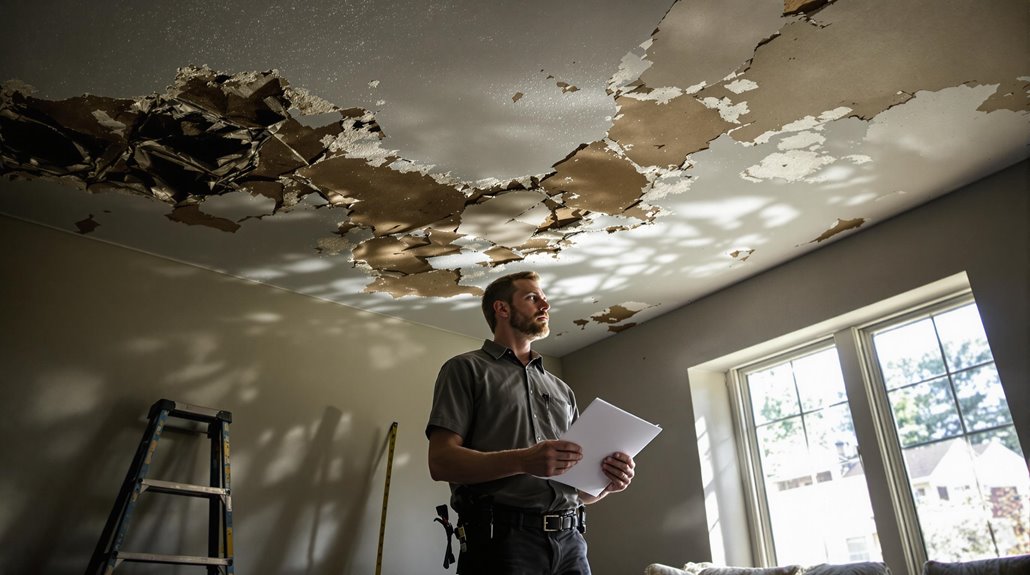Ever wondered who that person inspecting your storm-damaged roof is? Meet your insurance adjuster – think of them as the detective in your homeowners insurance story!
These state-licensed pros are like property damage investigators who piece together what happened and determine how much your insurance company should pay. They're the bridge between you and your insurance settlement, working to uncover the truth behind every fallen tree, burst pipe, or storm damage.
You'll encounter three main types of adjusters:
- Company adjusters (working directly for your insurer)
- Independent adjusters (hired guns for insurance companies)
- Public adjusters (your personal claims advocates)
Why does this matter to you? Because adjusters hold the keys to your claim's success. They'll document everything – from that cracked foundation to that water-stained ceiling – using photos, measurements, and detailed notes. It's like having a CSI team for your home damage!
Smart homeowners know that understanding an adjuster's role can make or break their claim. They speak the insurance language, know the fine print, and can spot covered damages you might miss. When disaster strikes, they're the ones transforming your damage into dollars and cents.
Want to maximize your claim? Build a good relationship with your adjuster, keep detailed records, and don't be afraid to ask questions. Remember, they're not just evaluating damage – they're helping you rebuild your piece of the American dream.
Key Takeaways
- An insurance adjuster evaluates damage and determines the insurance company's liability for property damage and loss in homeowners insurance policies.
- Adjusters gather evidence, communicate with policyholders, and negotiate settlements to minimize claim payouts while representing the company's interests.
- There are different types of insurance adjusters, including insurer adjusters, independent adjusters, public adjusters, and claims adjusters, each serving distinct roles.
- Homeowners can prepare for an adjuster's visit by gathering documentation, photographs, and repair receipts to facilitate a smooth claims process.
- Hiring a public adjuster can lead to higher settlements, faster resolutions, and expert navigation of the claims process for policyholders.
Understanding the Role of an Insurance Adjuster
The insurance adjuster plays a pivotal role in the homeowners insurance claims process. Their primary responsibility is to evaluate the damage and determine the insurance company’s liability for property damage and loss. In doing so, the adjuster meticulously examines the extent of the damage, taking into account both visible and hidden issues that may not be immediately apparent. They also review the homeowner’s policy to identify any relevant provisions, such as floater coverage in homeowners insurance, which may provide additional protection for high-value items. By thoroughly documenting their findings and collaborating with both the policyholder and the insurance company, the adjuster ensures that claims are processed fairly and efficiently.
To accomplish this, adjusters gather evidence such as photographs, repair estimates, and witness statements to support their evaluation of the claim. This evidence is vital in appraising the extent of the damage and the corresponding compensation amount.
Throughout the claims process, adjusters communicate with policyholders, explaining procedures and negotiating settlements with contractors and service providers. The adjuster's findings and recommendations greatly influence the approval or denial of claims, ultimately affecting the compensation amount policyholders may receive. Insurance adjusters typically focus on minimizing claim payouts while representing their company's interests in the settlement process.
Types of Insurance Adjusters and Their Responsibilities

Insurance adjusters can be broadly classified into distinct categories based on their affiliations and the interests they represent. These classifications are significant in understanding the role of insurance adjusters in the claims process.
There are four key types of insurance adjusters:
- Insurer adjusters: Work directly for insurance companies to investigate claims, gather estimates, and assess damage.
- Independent adjusters: Handle claims for insurers on a freelance basis, often in areas where the insurer lacks a local presence.
- Public adjuster: Represents the policyholder's interests, evaluating damages and negotiating settlements with the insurer for a fee.
- Claims adjusters: May work in any of the above categories, responsible for inspecting damages, consulting records, and determining liability under policy terms.
Understanding these categories is essential for policyholders to navigate the claims process effectively. Each type of insurance adjuster plays an important role in ensuring fair and efficient claims resolution. Studies have shown that hiring a public adjuster increases settlements by up to 800% compared to handling claims independently.
The Claims Process: How Adjusters Evaluate Damages

In the claims process, the adjuster plays a pivotal role in evaluating property damages to determine claim outcomes.
Through on-site inspections and reviews of the homeowner's insurance policy, adjusters gather and document evidence to assess the extent of damages and applicable coverage.
This evaluation process enables adjusters to provide an informed and objective assessment of the claim, ultimately leading to a determination of the claim's outcome.
Initial claim acknowledgment periods typically range from 10-30 days while adjusters conduct their systematic examination of property damage.
Adjuster's Role and Responsibility
Evaluating damages is a critical component of the claims process, and adjusters play a pivotal role in determining the extent of the loss and subsequent compensation.
The adjuster's role and responsibility encompass various tasks that ultimately impact the decision on whether to approve or deny the claim, as well as the amount of compensation awarded.
Key responsibilities of an adjuster include:
- Inspection and Documentation: Inspecting the property, documenting findings through photographs and detailed reports, and appraising the extent of the loss.
- Policy Review: Thoroughly reviewing the insurance policy to understand coverage specifics and potential compensation entitlements.
- Communication: Communicating with policyholders throughout the claims process, explaining the steps, gathering necessary information, and negotiating settlements.
- Report Compilation: Compiling findings and recommendations into a report that directly impacts the claims decision.
Processing times for adjusters to complete damage assessments and inspections can range from a few days to several months depending on the complexity of the damage.
Evaluating Property Damages
Conducting a thorough damage assessment is a critical step in the claims process, as it enables adjusters to determine the extent of the loss and subsequent compensation.
To accomplish this, home insurance adjusters assess property damages by conducting on-site inspections, documenting both interior and exterior damage with photographs and detailed notes.
Adjusters may also interview homeowners and witnesses, and gather repair estimates to support their assessment of the damages.
This information is compiled into a detailed report outlining the findings and recommendations, which informs the insurer's decision to approve or deny the claim based on the documented evidence and findings.
This process plays a significant role in resolving the insurance claim and determining the insurance company's liability.
Understanding policy coverage limits helps adjusters make accurate assessments of covered damages versus excluded events during the evaluation process.
Determining Claim Outcomes
Damage assessment reports are a pivotal component in determining claim outcomes, as they provide an extensive overview of the loss and subsequent compensation. When an adjuster arrives at the scene, they inspect the property, documenting both interior and exterior damage, and taking photographs to support the claim file.
This thorough evaluation enables the adjuster to evaluate the extent of loss and determine a fair settlement for the insurance claim.
Key factors in determining claim outcomes include:
- Policy Review: Evaluating coverage limits and applicable deductibles outlined in the homeowner's insurance policy.
- Damage Evaluation: Inspecting the property to determine the extent of loss.
- Documentation: Compiling evidence, including photographs, to support the claim.
- Report Preparation: Preparing detailed reports outlining findings and suggested compensation amounts.
Preparing for an Adjuster's Visit: Essential Documents and Tips

To effectively prepare for an adjuster's visit, homeowners should prioritize documenting property damage through clear photographs and detailed notes, which will provide a thorough overview of the situation.
This documentation will enable adjusters to accurately assess the extent of the damage and facilitate informed discussions regarding the claim.
Documenting Property Damage
A well-documented record of property damage is vital for a smooth and efficient claims process. Homeowners should take clear photographs and detailed notes of all visible damage to provide a thorough record for the home insurance adjuster during their visit.
The following documents and actions are important for documenting property damage:
- Photographic evidence: Take clear photographs of all visible damage from multiple angles.
- Detailed notes: Record a detailed description of the damage, including the location and extent of the damage.
- Repair estimates and receipts: Organize relevant documents, such as repair estimates and receipts, to present during the adjuster's assessment.
- Damaged items list: Create a detailed list of all damaged items, including their estimated values, to help streamline the claims process and guarantee fair compensation from the insurance claims adjuster.
Understanding Adjuster Expectations
Prior to the insurance adjuster's visit, numerous essential documents and materials must be prepared to facilitate a smooth and efficient assessment process. To support their claims, homeowners should gather the following documents and information:
| Required Documents | Description | Importance |
|---|---|---|
| Insurance Policy | Policy details and coverage limits | Determines claims validity and payout |
| Photographs | Visual evidence of damage | Supports claims and assessment |
| Repair Receipts | Documentation of previous repairs | Helps assess pre-existing conditions |
| Correspondence | Previous communication with insurer | Provides claims history and context |
| Damaged Items List | Estimated values of damaged items | Facilitates adjuster's evaluation and claims settlement |
How to Deal With an Adjuster: Negotiating and Settling Claims

Negotiating with an insurance adjuster requires a strategic approach, supported by thorough documentation and a clear understanding of the claims process. Effective negotiation is vital to achieve a fair settlement in an insurance claim.
Key considerations when negotiating with an adjuster:
- Documentation: Present thorough documentation of all damages, including photographs, repair estimates, and a detailed inventory of damaged items.
- Accuracy: Review the adjuster's report for accuracy and completeness, and provide additional evidence if necessary.
- Communication: Maintain open communication with the adjuster throughout the claims process to guarantee a clear understanding of your coverage.
- Advocacy: Consider enlisting the help of a public adjuster if negotiations stall or you feel the offered settlement is insufficient.
The Impact of Adjuster Findings on Claims Approval or Denial

Insurer decisions regarding homeowners insurance claims heavily rely on the findings compiled by adjusters. The adjuster's evaluation of damage and policy coverage limits plays a vital role in determining whether a claim is approved or denied.
Adjusters compile detailed reports that outline their assessment of the damage, which insurers closely follow when making final decisions on claims. If the adjuster's evaluation supports the claim, insurers may issue a payment quickly, while unfavorable findings can lead to a denial or a considerably lower settlement offer.
Homeowners can challenge adverse evaluations by providing additional documentation or evidence to support their claims, which may influence the insurer's decision. Understanding the adjuster's report and its recommendations is essential for homeowners to navigate the claims process effectively and advocate for their interests.
Ultimately, the adjuster's findings have a substantial impact on the outcome of insurance claims, emphasizing the importance of a thorough and accurate assessment.
Understanding the Cost of Hiring a Public Adjuster

A crucial consideration for homeowners contemplating hiring a public adjuster is the associated cost, typically a fee ranging from 10% to 15% of the total claim amount.
Public adjusters may help navigate the home insurance claim process by providing expertise in evaluating and negotiating claims.
Key benefits of hiring a public adjuster include:
- Expertise in negotiations: Public adjusters' knowledge of the claims process and their ability to effectively navigate negotiations may result in higher settlements.
- Contingent payment terms: Fees for public adjusters are often contingent upon successful recovery of a claim, ensuring they only receive payment if the claim is approved.
- Upfront consultations: Public adjusters may provide initial consultations to help evaluate the potential value of a claim before agreeing to their services.
- Efficient claim resolution: Hiring a public adjuster can lead to faster claim resolutions due to their understanding of the claims process, though compensation may impact overall settlement amounts.
Disputing an Insurance Claim: Options and Next Steps

When a homeowner disagrees with the outcome of their insurance claim, understanding the options for disputing the decision is vital. The first step is to review the adjuster's report for accuracy, guaranteeing all documentation is complete and correct.
If a claim is denied or the payout is unsatisfactory, policyholders should gather supporting evidence, such as photographs and repair estimates, to strengthen their case. Direct communication with the insurance company can help clarify discrepancies and facilitate the dispute resolution process.
If disputes persist, homeowners may consider hiring a public adjuster to negotiate on their behalf. A public adjuster can guarantee the homeowner's interests are represented during the claims process.
Before considering legal action, homeowners should follow the insurance company's formal appeals process, as this may lead to a resolution without escalating the situation. A well-supported dispute can lead to a revised insurance claim outcome, providing adequate compensation for the policyholder's losses.
The Benefits Of Consulting A Public Adjuster

Consulting a public adjuster offers several benefits to policyholders maneuvering the complex process of insurance claims.
A public adjuster's expertise in insurance claims and objective damage assessment enables them to provide an accurate evaluation of the damage, which is essential in determining the claim's outcome.
Expertise In Insurance Claims
While managing the complexities of insurance claims can be overwhelming for homeowners, the expertise of a public adjuster can provide a distinct advantage in securing fair compensation for covered damages.
A public adjuster's extensive knowledge of insurance policies and claims processes enables them to effectively advocate for policyholders.
Key benefits of a public adjuster's expertise include:
- Effective claims navigation: Public adjusters understand the intricacies of insurance policies, ensuring homeowners receive fair compensation for covered damages.
- Accurate damage assessment: They help document damages, preparing detailed claims to support the policyholder's case.
- Maximized settlements: Public adjusters often secure more favorable outcomes compared to homeowners negotiating directly with insurers.
- Reduced stress: By handling the claims process, public adjusters provide much-needed help, allowing homeowners to focus on recovery and rebuilding under their insurance cover.
Objective Damage Assessment
Damage assessment is a significant aspect of the insurance claims process, requiring meticulous documentation and evaluation of property loss to determine fair compensation.
Consulting a public adjuster can facilitate an objective damage assessment, as they are experienced in documenting and evaluating property loss. Public adjusters work exclusively for the policyholder, providing an unbiased perspective that can help challenge unfavorable evaluations made by the insurance company's adjuster.
Their expertise enables them to identify coverage loopholes, potentially increasing the scope of the claim. By engaging a public adjuster, homeowners can guarantee a more accurate assessment of damages, leading to fairer compensation from the insurance company.
This objective assessment is essential in resolving claims efficiently and effectively.
Streamlined Claim Process
Numerous benefits arise from utilizing the services of a public adjuster, primarily in the domain of streamlining the claims process. By leveraging their expertise, policyholders can navigate complex insurance procedures more efficiently.
The advantages of consulting a public adjuster in streamlining the claims process include:
- Thorough documentation: Public adjusters guarantee that all damages are accurately assessed and documented, potentially leading to higher settlements.
- Expert negotiation: Their experience in negotiating with insurance companies can result in faster and more favorable settlements.
- Regulatory knowledge: Public adjusters are well-versed in insurance policies and local regulations, enabling them to identify additional coverage options.
- Expedited resolution: Their involvement can lead to faster negotiations and resolutions, alleviating the burden on policyholders.
Higher Claim Payouts & Settlements
Involvement of a public adjuster in the claims process can considerably enhance the policyholder's financial recovery. This is because public adjusters have expertise in thoroughly evaluating damages and negotiating on behalf of the policyholder, often resulting in higher claim payouts.
| Benefits of Public Adjusters | Impact on Claim Payouts |
|---|---|
| Expert damage evaluation | 10-15% higher settlements |
| Independent negotiation | Maximizes settlement amount |
| Detailed evaluation and documentation | Strengthens policyholder's position |
About The Public Claims Adjusters Network (PCAN)

The Public Claims Adjusters Network (PCAN) offers an extensive solution for policyholders steering through complex insurance claims.
As a national network of state-licensed public adjusters, PCAN connects policyholders with experts who specialize in residential and commercial property damage insurance claims.
Key features of the Public Claims Adjusters Network (PCAN) include:
- Pre-vetted and verified public adjusters: Ensuring expertise and professionalism in handling claims.
- Wide claim coverage: Over 30 different claim types and 40+ states covered by member adjusters.
- Rigorous quality control: Mandatory yearly audits of licenses and complaints to maintain high standards.
- Resource for top public adjusters: Connecting policyholders with the best-of-the-best in the industry.
Frequently Asked Questions
What Does a Homeowner Adjuster Do?
Like a meticulous puzzle solver, a homeowner adjuster pieces together claim evidence, evaluating damage and liability. They navigate homeowner responsibilities, bring adjuster qualifications to bear, and guide policyholders through the claim process with technical expertise.
What Not to Say to a Homeowners Insurance Adjuster?
Homeowners should avoid admitting fault, providing excessive details, or discussing unrelated claims with the adjuster. Effective communication tips and claim strategies emphasize factual reporting, thorough review of reports, and calm demeanor to prevent common mistakes impacting claim outcomes.
What Happens After an Insurance Adjuster Comes to Your House?
Following the adjuster's visit, the homeowner awaits the claim process to proceed, contingent upon the inspection outcome and damage assessment detailed in the adjuster's report, which determines the extent of damage and compensation for the claim.
What Is an Adjuster in Insurance?
An adjuster in insurance is a professional responsible for evaluating insurance claims, appraising damage, and determining policy liability. Adjuster roles involve inspecting properties, documenting findings, and preparing reports to facilitate informed policy evaluations and claims resolutions.








